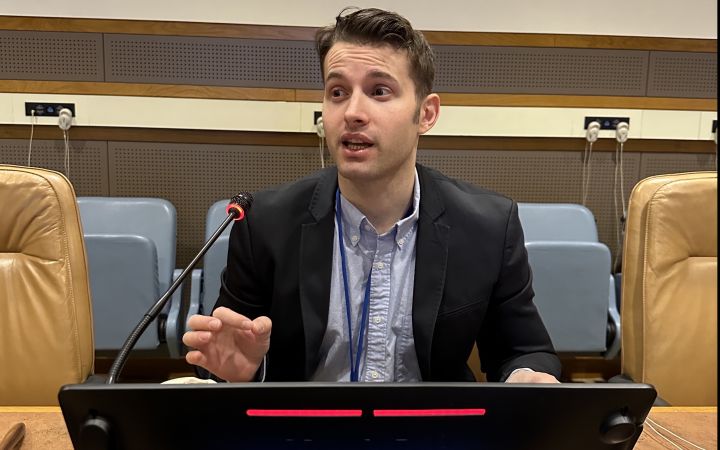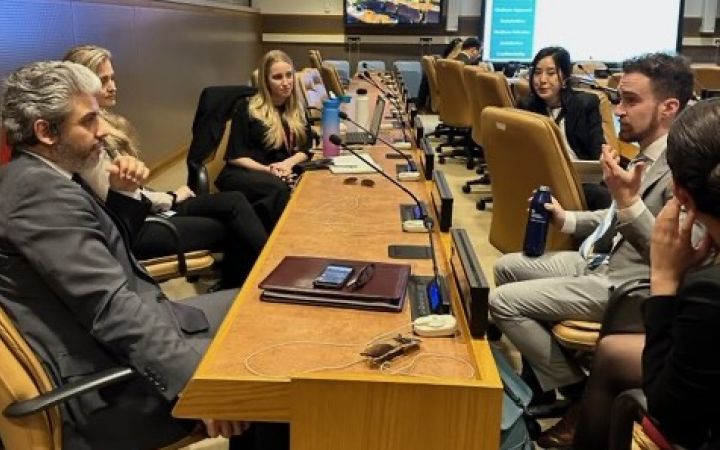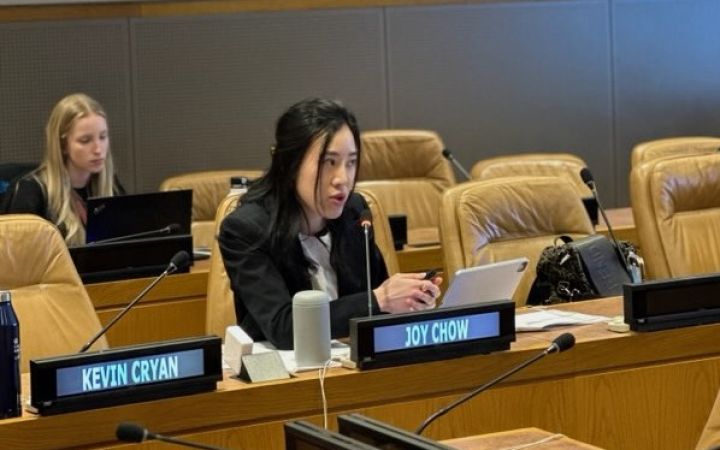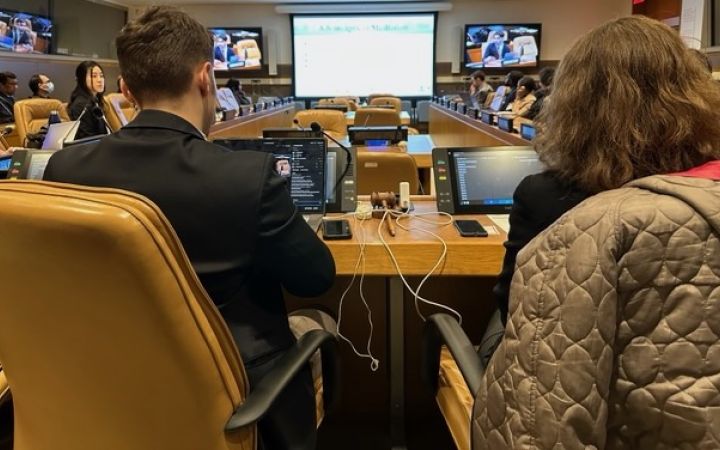3 April 2023, New York, USA – The United Nations Institute for Training and Research (UNITAR), New York Office and Columbia Law School hosted the second session of the Spring 2023 Columbia Law School Mediation Clinic training series. The workshop was entitled “Mediation and Human Rights” and took place on Monday, 3 April 2023.
Mr Pelayo Alvarez, programme manager of the UNITAR New York Office, launched the event by introducing the topic of mediation to the audience and explained how mediation can play a crucial role in settling disputes related to human rights violations. This workshop aimed to discuss the implications of mediation, and how it may affect the different parties and help advance systematic change. After the welcoming remarks, the programme was led by Brenton Browne, Kevin Cryan, Joy Chow, Sasha Yusuf, Sonia Helen Pascale, and Professor Rebecca Price.
Mr Sasha Yusuf started by introducing the learning outcomes of the workshop: recognizing the underlying interests of parties to human rights disputes and considering the role and the process choices of mediation in human rights work and scenarios. Before diving into these subjects, Mr Yusuf went into defining the framework of human rights, which he divided into two categories: civil and political on the one hand and economic, social and cultural on the other hand. He then proceeded to explore a range of human rights issues, including but not limited to privacy rights, nationality and statelessness and the right to social security and protection. As the first interactive activity of the workshop, the attendees provided specific examples of human rights issues in their work or country.
After Mr. Yusuf presented some relevant SDGs, Mr. Brenton Browne gave an umbrella definition of mediation: a process in which an impartial third party facilitates a negotiation between two others, to empower them. Its advantages are collaborative problem-solving which facilitates creative solutions, addressing issues at the right time as well as a lower cost and ease of access, in addition to enabling settlement. However, mediation has some disadvantages such as the existence of power imbalances, the amount of stakeholders and how time-consuming it can be.
The first example of human rights mediation is Transitional Justice: Disarmament, Demobilization and Reintegration (DDR), which has as a goal the reintegration of Afghanistan. Mr Browne informed the participants that while the first model did not include mediation, the programme featured it as an important process in 2011, along with Rapid Response Teams and Peace and Reintegration Councils. It's Mediation and Reintegration Training consists of three phases: identifying key issues, exploring the different options, and signing an agreement that meets all interests. The programme resulted in the training of 400 people to help with reintegration. Another example of how a successful mediation helped resolve human rights disputes can be shown in Colombia, where the DDR programme played a crucial role in the establishment of a peace agreement between the FARC and the government, yielding positive results.
Ms Sonia Helen Pascale introduced the second example of human rights mediation, which focuses on business human rights violations which encompass labour rights standards, discrimination and the right to access safe drinking water or adequate housing, among others. She explained that these issues are uniquely suited for mediation because of their qualified nature in addition to providing leeway in interpretation and giving multiple avenues for understanding a remedy. Ms. Pascale provided two examples to illustrate these unique circumstances, and then dived into the gold mining case study of Peru, between a big corporation and the local communities. A mediation process led by a nonprofit organization allowed the parties to reach a mutual solution, a successful outcome for everyone involved. This shows that by bringing the parties together in a neutral setting, mediation can help to build trust and facilitate dialogue.
After a short break, Mr Kevin Cryan led an interactive exercise where he encouraged the participants to speak about their experiences with the different dimensions of power, including visible, hidden and invisible power. The takeaway of this exercise is the importance of considering the different forms of power that can come into play in any conflict, notably to address power imbalances, which play a significant role in human rights cases. In this instance, it is important to set ground rules for human dignity and the right to speak uninterrupted, as well as create a space for free expression. Furthermore, it helps to provide advocates for unrepresented sides and educate the parties about the mediation process. Finally, it can be necessary to exclude certain types of cases from mediation.
Ms Joy Chow then discussed private settlements and the tensions that may come with them, such as confidentiality and the role it plays when it comes to the efficiency of mediation in human rights and systematic change when transparency is limited. Ms Chow suggested that we should balance two opposing forces: while confidentiality may hinder the advancement of systemic change, it enables the parties to share their true feelings, concerns and interests to better identify the underlying issues. Ms Chow shared two case studies in Guatemala and Kenya, where mediation and confidentiality helped ensure that the rights of the communities were respected. It is still possible to provide transparency in a confidential setting by using alternative approaches to full disclosure, such as anonymity, annual reporting, or public education and awareness. Ms Joy also discussed some process choices in mediation system design when it comes to factors such as the timing of the intervention, the source of authority and the mediator approach.
After giving an example of a mediation programme using these criteria, Mr Cryan asked the attendees to design their mediation programme in the last activity of the workshop.
At the end of the course, Mr Alvarez delivered closing remarks on behalf of UNITAR, reminding participants of the upcoming courses in the series.





